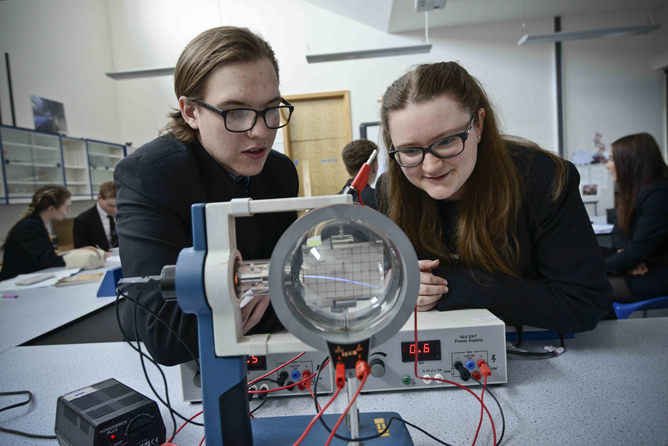Physics is about unravelling the universe to try and find out how it works.
Discoveries in Physics have been at the heart of most advances in technology. It is an exciting and challenging subject to study, requiring an enquiring mind and clear thinking. The range of ideas in Physics could not be greater - from observing the furthest reaches of the universe to experiments on the inner secrets of the nucleus.
The rewards of Physics include a deeper understanding of the universe and the development of skills that are highly sought after by both universities and employers.
Why Physics?
The skills gained through studying Physics are in high demand in the world. It is a well-respected academic and scientific subject. Degree courses that may be open to students of Physics include Engineering, Medicine, Mathematics and Computing, as well as Physics, Astrophysics and Electronics.
Any special requirements?
If students have taken Separate Sciences at GCSE, they must have achieved grade 6 or above in Physics plus one other from Chemistry or Biology. If students have taken Combined Science at GCSE, it is desirable that students have achieved grade 7 or above.
As the maths content of the course is substantial, we would prefer at least a grade 6 in the mathematics higher paper. It is also recommended that one of your other AS subjects be mathematics, particularly if you are planning to continue on to the A-level course.
You should be aware though that nearly all Engineering, Physics and related degree courses require you to have A-level Mathematics.
What will I study?
Year One:
- New ideas in physics, such as Particle Physics - fundamental properties and the nature of matter, radiation and quantum phenomena;
- The application of in-depth knowledge of well-established topics as electricity;
- The principles and applications of mechanics - vectors, forces and energy
- Materials - their bulk properties and tensile strength
- Waves - their characteristics, properties and applications of waves, including refraction, diffraction, superposition and interference
Year Two:
AS content as above along with the following topics:
- Motion - circular and oscillatory, further vectors
- Fields - electric and magnetic
- Nuclear and Thermal Physics - characteristics of the nucleus, unstable nuclei and energy
- An optional topic - to gain deeper understanding and awareness of a selected branch of physics - possibly Astronomy and cosmology, Electronics, Medical Physics or Engineering Physics.
How will I be assessed?
You will be assessed 100% through examination. The A-level course will also have a practical endorsement taken along-side the written examinations, which does not contribute to the final A-level grade.

Purpose and Provision
Download a copy of the Science Departments Purpose and Provision document here.
Curriculum Map
Download a copy of the Science Departments Curriculum Map document here: Key Stage 5